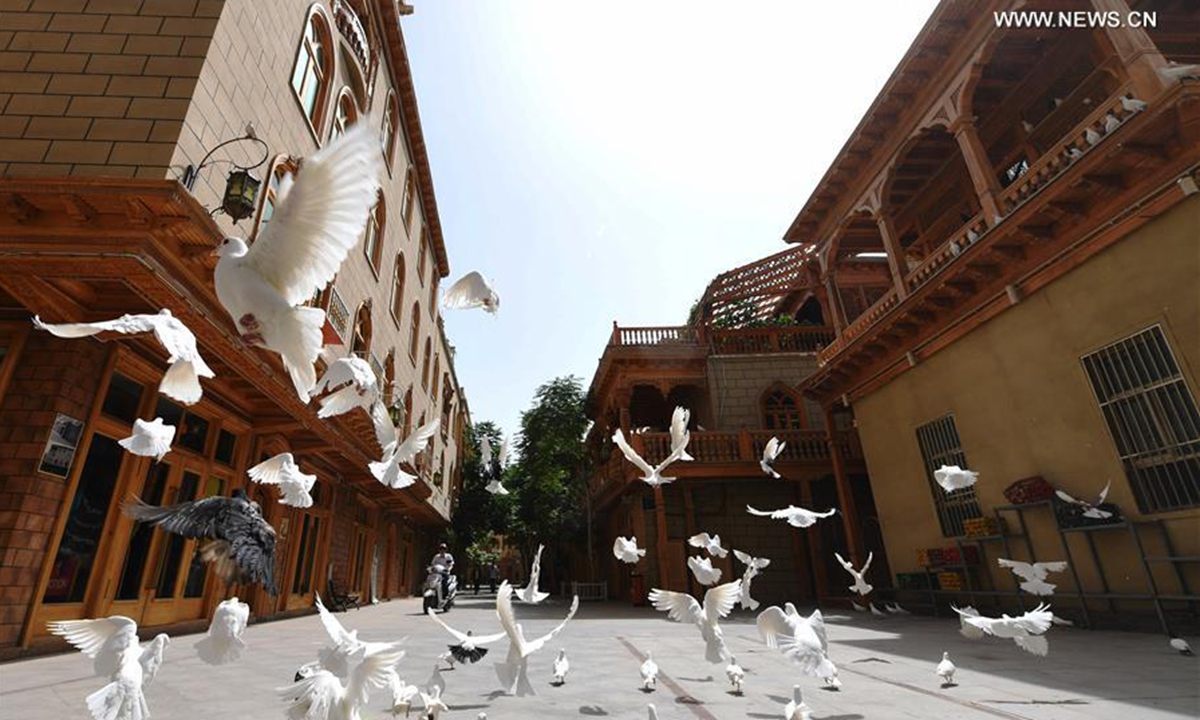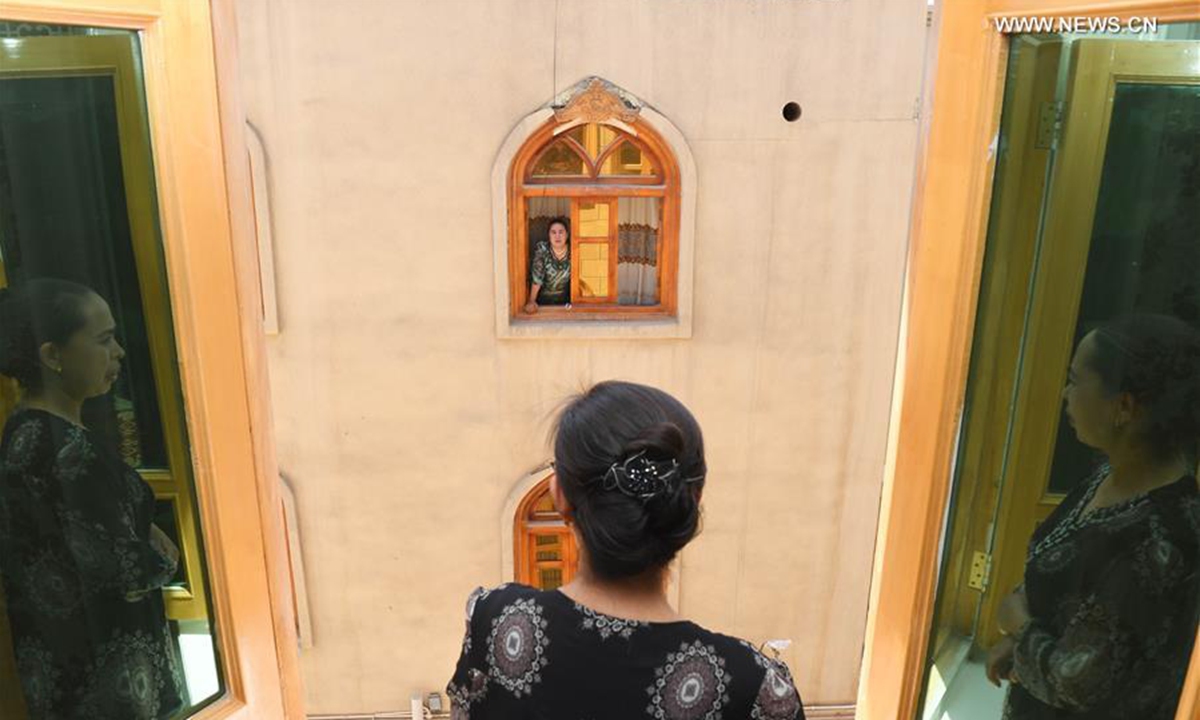US continues to play Xinjiang card with bill despite high-level talks

Doves are seen in the "Dove Lane" in the old town Tuancheng of Hotan City, northwest China's Xinjiang Uygur Autonomous Region, May 26, 2020. Gezixiang, meaning "Dove Lane", inside the old town Tuancheng in Hotan City, used to be a place for people to trade doves. After four years of renovation, the lane was turned into a tourist attraction with family inns and stores selling local signature products. The renovation project of this old town in Hotan is still in progress, aiming to build this place into a historical block that attract tourists with its distinctive characteristics and culture. (Xinhua/Sadat)
US President Donald Trump signed a so-called Uygur bill on Wednesday, which defames human rights situation in China's Xinjiang Uygur Autonomous Region and potentially slaps more sanctions on Chinese companies and officials over Xinjiang-related issues. The move was made the day China's senior diplomat Yang Jiechi met US Secretary Mike Pompeo in Hawaii at the latter's request, and shattered the previous anticipation of softening strained ties.
Wednesday and the following 24 hours witnessed several important political events: the so-called Uyghur Human Rights Policy Act took effect, Yang talked with Pompeo, and the national security law for Hong Kong was submitted for deliberation, together with the G7 declaration on it, which could be seen as the occasion for China and the US to put "all their cards" on the table, experts said.
Trump purposely picked the date of the talks, initially hoping to put pressure on China. The move also shows that the US will not change its tough policies toward China, experts said.
The Uygur bill, first put forward by Senator Marco Rubio, was passed by both Houses of Congress on May 14 and 27, respectively. According to information from the US Congress' website, the bill was presented to Trump on June 8. If Trump does not sign it into law or vetoes it within 10 days, the bill becomes law without his signature.
The bill requires the US government to impose more pressure on China over Xinjiang issues and offer a report to Congress within 180 days of its enactment to list Chinese officials to be sanctioned by the US, US media reported.
Four government agencies, including the Chinese Foreign Ministry, the foreign affairs committees of the National People's Congress (NPC) and the Chinese People's Political Consultative Conference (CPPCC) National Committee as well as Xinjiang regional legislature released statements condemning the US move.
Trump signed the bill on Wednesday without any ceremony, issuing a statement that a sanctions provision intruded on executive authority, and that he would consider it non-binding.
"These details showed that Trump is trying to find a balance with the US Congress - he had to sign the bipartisan bill, but also wants to cool tensions with China," Zhu Ying, deputy director of the Human Rights Institute at the Southwest University of Political Science and Law, told the Global Times.
"Trump may seek the advice of White House lawyers on how to sign the bill without provoking China. But his move is meaningless, as the bill has been signed, and the US can use it whenever it wants," Zhu said.
Regardless of Trump's gestures, it will not change the fact that the US continues to play the Xinjiang card with the Uygur bill despite high-level talks, and will continue putting pressure on China on human rights and religious freedom, experts said.
Jia Chunyang, an expert from the China Institutes of Contemporary International Relations, told the Global Times that there should be no dirty tricks when one side is sincere on alleviating tensions and holding talks, while Americans think differently: They fight while seeking cooperation when it fits their interests.
"These sinister tricks make us doubt its sincerity in seeking to improve China-US ties, and will also affect cooperation in other fields," Jia said.
Worst-case scenario
Wednesday also saw a large coverage in international media of John Bolton's new book, in which the ex-national security adviser claimed Trump backed China to launch a "camp" in Xinjiang and sought the Chinese leader's support for his re-election at a G20 meeting in Osaka, Japan in 2019.
As an anti-China hardliner, Bolton is using his book to smear China for getting involved in the US election and vent on Trump. He also wants to further muddy the waters of US domestic politics, experts said.
Chinese Foreign Ministry Spokesperson Zhao Lijian told a press briefing on Thursday that China has no intention to and will not interfere in US domestic affairs.
The eye-catching tip from Bolton's book on Trump's seeking China's help for his re-election also shows that between China and the US, the latter needs the former more, observers said.
Although the ongoing epidemic in the US as well as the fierce competition for election make both Democrats and Republics eager to play China cards, especially competing in which side is tougher toward China, it is the US that needs China more, experts said.
The Chinese Foreign Ministry said that, Yang Jiechi, a member of the Political Bureau of the Communist Party of China (CPC) Central Committee and director of the Office of the Foreign Affairs Commission of the CPC Central Committee, met Pompeo at the latter's request on Tuesday and Wednesday local time in the US state of Hawaii.
The release debunked the Wall Street Journal's report on Wednesday which said the meeting "was requested" by Beijing.

Residents talk to each other in Gezixiang, or "Dove Lane", in the old town Tuancheng of Hotan City, northwest China's Xinjiang Uygur Autonomous Region, May 27, 2020. Gezixiang, meaning "Dove Lane", inside the old town Tuancheng in Hotan City, used to be a place for people to trade doves. After four years of renovation, the lane was turned into a tourist attraction with family inns and stores selling local signature products. The renovation project of this old town in Hotan is still in progress, aiming to build this place into a historical block that attract tourists with its distinctive characteristics and culture. (Xinhua/Sadat)
It's the US' fault that ties with China have suffered their lowest ebb in decades, and it is necessary for the two sides to sit together and exchange ideas on key strategic topics to diffuse miscalculations, Sun Chenghao, an assistant research professor at the Institute of American Studies of the China Institutes of Contemporary International Relations, told the Global Times on Thursday.The US took the initiative to seek talks with China, which shows that it faces more problems. Regarding statements released by each side, the meeting was not about niceties. China elaborated its stance on Xinjiang, Taiwan and Hong Kong. Observers said this was a chance for both sides to put "all their cards" on the table.
Lü Xiang, a research fellow on US studies at the Chinese Academy of Social Sciences, told the Global Times on Thursday that for the US, the economy is the top priority. If China-US ties continue to worsen, any trade deal would be "mission impossible."
"So the US needs to at least fix the trade ties with China, and if Trump can settle the tensions, it would be an achievement for him to show US voters and mock his opponent Joe Biden, Lü said. "The US needs China much more than China needs the US."
Sun said that US unilateralism and "America first" policy have struck a blow to globalization, which forced China to make a Plan B, like further investing in independent research and development of high technologies to avoid bottlenecks from the US.
However, the US has no clear strategy or consistent framework on its policies on China. It considers China as its main competitor but refuses to recognize possible confrontations this might stir, Sun said.
China always sticks to a bottom line when dealing with bilateral ties - endeavoring to have cooperation with the US for win-win. It is the US that has been "kidnapped" by hardliners, exerting extreme policies, playing cards on Taiwan, Xinjiang, Hong Kong and Tibet to challenge and test China's boundary, and bring uncertainty to the ties, Yuan Zheng, a research fellow at the Chinese Academy of Social Sciences (CASS), told the Global Times on Thursday.
Learning from previous experiences, especially the bumps during the trade talks, China has learned that China-US ties can never be restored to the previous level, Yuan noted.
Yuan and some experts reached by the Global Times said that they are not too optimistic about China-US ties in the near future considering the coming US election. No matter who wins, the US may not change its tougher policies toward China.
Chinese analysts also said during the meeting with Pompeo, Yang stressed China's bottom line on issues including Taiwan, Hong Kong and Xinjiang, and this was an important signal to the US - that China wants no trouble with the US and it welcomes a reasonable US. But if the US crosses the line, China will not hesitate to protect its core interests and sovereignty.
In other words, China will not exchange its core interests with the US to merely maintain stable ties. So US policymakers should not miscalculate the issue, analysts noted.
- Natl security law for HK submitted to top legislature, likely to be 'enacted by end of this month'
- Chinese senior diplomat warns US over HK, Taiwan and Xinjiang interference
- China vows to take countermeasures over US' Xinjiang bill
- US continues to play Xinjiang card with Uygur bill despite high-level talks
- China firmly opposes Xinjiang-related bill signed by Trump